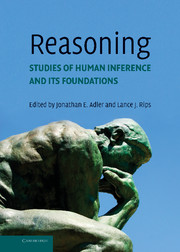Book contents
- Frontmatter
- Contents
- Preface
- List of Contributors
- Introduction: Philosophical Foundations
- PART I FOUNDATIONS OF REASONING
- Section 1 Some Philosophical Viewpoints
- Section 2 Fallacies and Rationality
- 5 When Rationality Fails
- 6 Extensional Versus Intuitive Reasoning: The Conjunction Fallacy in Probability Judgment
- 7 Can Human Irrationality Be Experimentally Demonstrated?
- 8 Breakdown of Will
- PART II MODES OF REASONING
- PART II INTERACTIONS OF REASONING IN HUMAN THOUGHT
- Index
- References
5 - When Rationality Fails
Published online by Cambridge University Press: 05 June 2012
- Frontmatter
- Contents
- Preface
- List of Contributors
- Introduction: Philosophical Foundations
- PART I FOUNDATIONS OF REASONING
- Section 1 Some Philosophical Viewpoints
- Section 2 Fallacies and Rationality
- 5 When Rationality Fails
- 6 Extensional Versus Intuitive Reasoning: The Conjunction Fallacy in Probability Judgment
- 7 Can Human Irrationality Be Experimentally Demonstrated?
- 8 Breakdown of Will
- PART II MODES OF REASONING
- PART II INTERACTIONS OF REASONING IN HUMAN THOUGHT
- Index
- References
Summary
Introduction
There are two ways in which theories can fail to explain: through indeterminacy and through inadequacy. A theory is indeterminate when and to the extent that it fails to yield unique predictions. It is inadequate when its predictions fail. Of these, the second is the more serious problem. A theory may be less than fully determinate and yet have explanatory power if it excludes at least one abstractly possible event or state of affairs. To yield a determinate prediction, it must then be supplemented by other considerations. The theory is weak, but not useless. It is in more serious trouble if an event or state of affairs that actually materializes is among those excluded by the theory. In saying this, I am not espousing naïve falsificationism, but simply making the common-sense observation that it is worse for a theory to predict wrongly than to predict weakly but truthfully. In the former case it must be replaced or modified, not supplemented.
My concern here is not with scientific theories in general, but with failures of rational-choice theory. As argued below, rational-choice theory is first and foremost a normative theory and only secondarily an explanatory approach. It tells people how to act and predicts that they will act in the way it tells them to. To the extent that it fails to give unambiguous prescriptions, it is indeterminate.
- Type
- Chapter
- Information
- ReasoningStudies of Human Inference and its Foundations, pp. 94 - 113Publisher: Cambridge University PressPrint publication year: 2008
References
- 1
- Cited by



